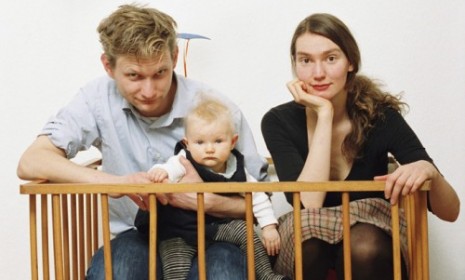Do 'perfect' babies require three parents?
Scientists have created a viable process for creating healthier children — all you need is a lab, one dad, and ... two moms

British researchers have come up with a way to prevent certain hereditary diseases — but it involves creating children with three genetic parents. The research is outlined in the new issue of the journal Nature. Here's a look at this sizable step toward making "designer babies," and some possible consequences of having children with two moms and one dad:
How do you make a baby with three genetic parents?
Researchers at Newcastle University in the U.K. have created a process for putting the DNA from the mother's egg and father's sperm into a hollowed-out egg belonging to a second woman. The resulting embryo has the DNA of the mother and father, plus a small amount of DNA from the egg donor — thus, three genetic parents.
The Week
Escape your echo chamber. Get the facts behind the news, plus analysis from multiple perspectives.

Sign up for The Week's Free Newsletters
From our morning news briefing to a weekly Good News Newsletter, get the best of The Week delivered directly to your inbox.
From our morning news briefing to a weekly Good News Newsletter, get the best of The Week delivered directly to your inbox.
How does this help combat diseases?
Certain genetic conditions leading to heart failure, blindness and muscle weakness are passed from mother to child through a specific form of genetic material called "mitrochondrial DNA." Mitochondria, tiny structures that provide most of a cell's energy, have separate DNA from the rest of the cell. The presence of a second egg with intact, healthy mitochondrial DNA can, in theory, prevent those diseases being passed on.
Sounds complicated. What's a simple analogy?
"What we’ve done is like changing the battery on a laptop," explains head researcher Doug Turnbull. "The energy supply now works properly, but none of the information on the hard drive has been changed." That is, the new battery is the healthy mitochondrial DNA belonging to the second woman — and the information on the hard drive is the rest of the DNA from the traditional mother and father.
A free daily email with the biggest news stories of the day – and the best features from TheWeek.com
How common are the diseases in question?
About one in 200 children is born with a usually mild mitochondrial abnormality, but one in 6,500 is born with a serious, incurable, and often fatal mitochondrial disease. While "it would be hype to say we are going to get rid of mitochondrial disease," says Alison Murdoch at the Newcastle Fertility Centre, "it's realistic to say you could get rid of it in an individual family."
So what's the problem?
Some scientists are not convinced that the potential benefits are worth the risks. The tiny amount of problematic mitochondrial DNA transferred to the clean host egg might still lead to mitochondrial disease, and nobody's exactly sure what the ramifications are of having two genetic mothers. "Simply, nobody on the earth ever had three biological parents," says Jun-Ichi Hayashi of the University of Tsukuba in Japan.
Who's flat-out opposed to the technique?
People who believe that experimenting on human embryos is always wrong, or those worried about the "slippery slope" to human cloning. The conservative Christian group Focus on the Family called the research "a further step toward tampering with the very essence of humanity" that shows "contempt for human life itself."
What happened to the three-parent embryos produced by the British scientists?
They were all destroyed, as mandated under U.K. law. The donor eggs were leftovers from in vitro fertility treatments, and would have been destroyed in any case.
What are the chances we'll ever see a three-parent child?
The researchers say the technique should be ready to help create disease-free children in as little as three years. But the ethical complications and current laws in Britain and elsewhere mean it will probably be much longer before three-parent embryos are allowed to be brought to term.
Sources: BBC News, Times of London, Daily Mail, NY Daily News, Discover, The Scientist, Christianity Today
-
 Saving for a down payment on a house? Here is how and where to save.
Saving for a down payment on a house? Here is how and where to save.the explainer The first step of the homebuying process can be one of the hardest
-
 Music reviews: Zach Bryan, Dry Cleaning, and Madison Beer
Music reviews: Zach Bryan, Dry Cleaning, and Madison BeerFeature “With Heaven on Top,” “Secret Love,” and “Locket”
-
 Book reviews: ‘The Mattering Instinct: How Our Deepest Longing Drives and Divides Us’ and ‘Family of Spies: A World War II Story of Nazi Espionage, Betrayal, and the Secret History Behind Pearl Harbor’
Book reviews: ‘The Mattering Instinct: How Our Deepest Longing Drives and Divides Us’ and ‘Family of Spies: A World War II Story of Nazi Espionage, Betrayal, and the Secret History Behind Pearl Harbor’Feature The pursuit of ‘mattering’ and a historic, devastating family secret